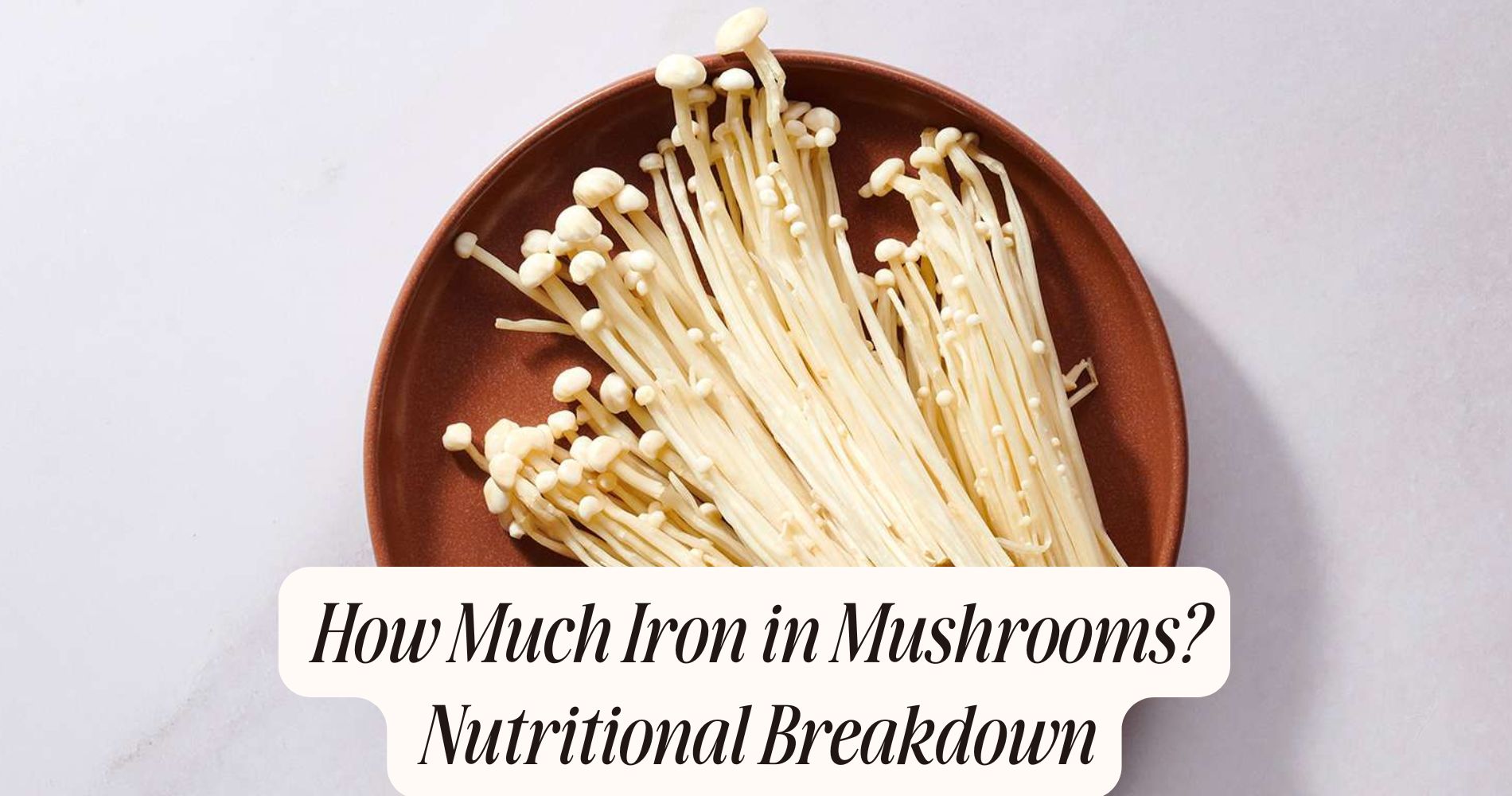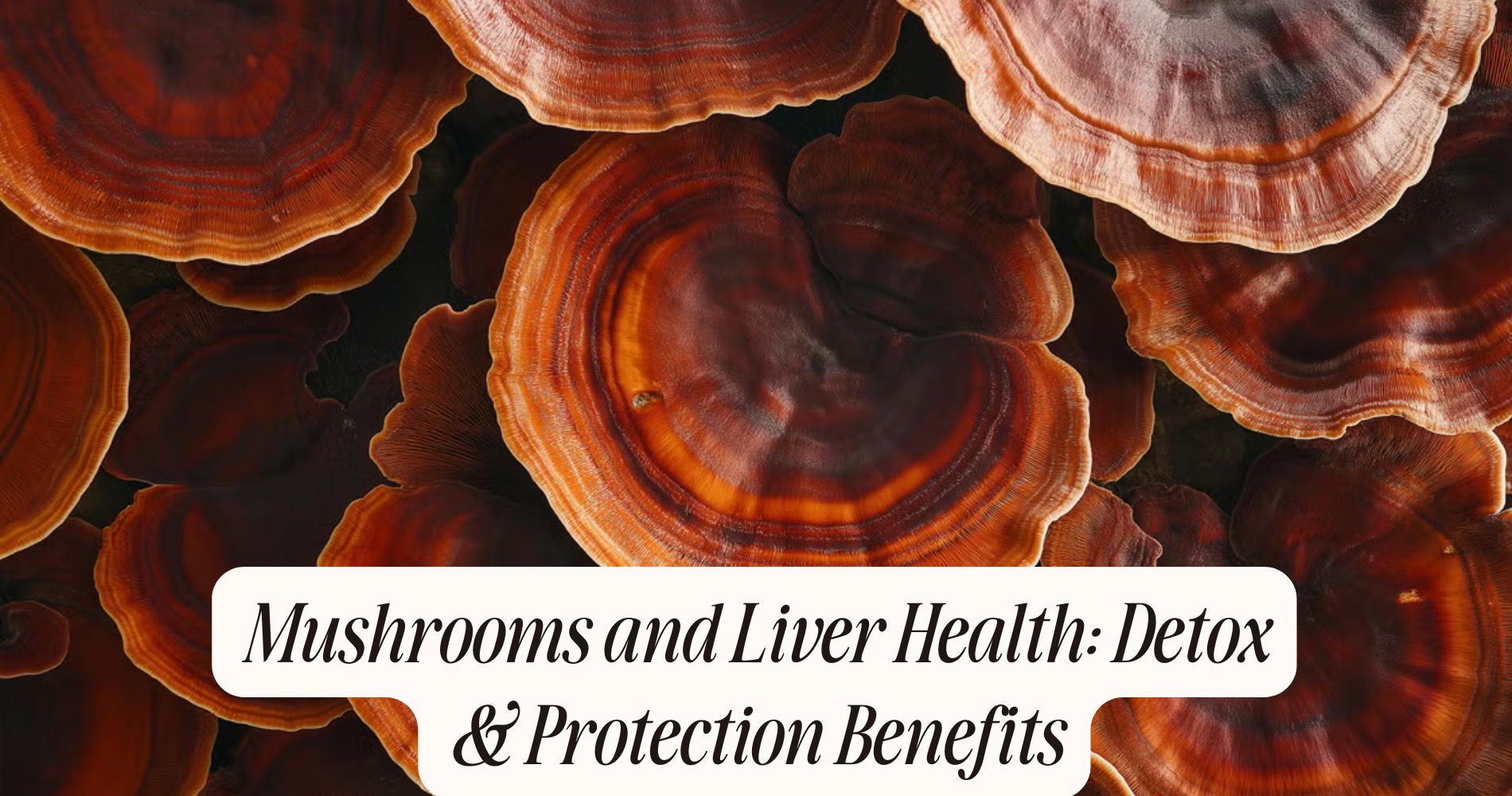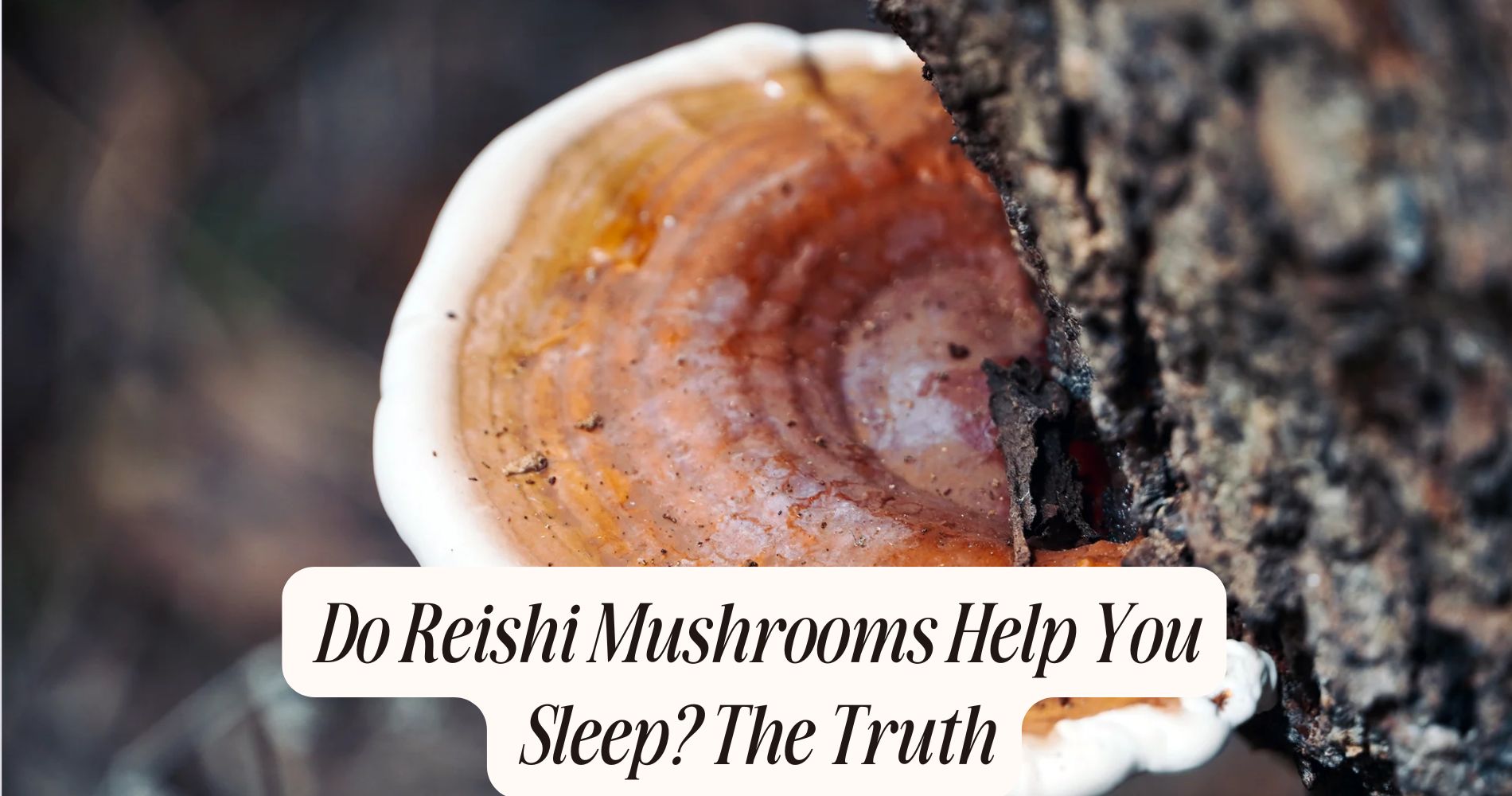
How Much Iron in Mushrooms? Nutritional Breakdown
How much iron in mushrooms? Mushrooms can boost your iron intake modestly. Varieties like shiitake and portobello provide about 0.4 to 0.5 mg of iron per 100 grams. This can help maintain your energy levels and support cognitive function. Enhance iron absorption by pairing mushrooms with vitamin C-rich foods and cooking them properly. You'll also benefit from their antioxidants and dietary fiber, making them a superb plant-based option for overall health. Discover how to integrate them effectively into your diet!
Understanding Iron and Its Importance
Iron, an essential mineral, plays an important role in your body by aiding in the production of hemoglobin, the protein in red blood cells responsible for transporting oxygen throughout your body.
This process highlights one of the primary iron functions necessary for maintaining energy levels and cognitive function. Without adequate iron, you can experience fatigue, weakened immunity, and impaired mental performance, common symptoms of iron deficiencies.
Iron also supports metabolic processes and contributes to DNA synthesis, essential for cell growth and differentiation.
When your iron levels drop, it can lead to anemia, a condition affecting millions worldwide.
Ensuring you get enough iron from your diet, including sources like mushrooms, can help prevent deficiencies and promote peak health and well-being.
Types of Mushrooms and Their Iron Content
While understanding the significance of iron in maintaining bodily functions, it's important to explore how mushrooms can contribute to your iron intake.
Shiitake mushrooms are a popular choice, offering a modest amount of iron, enhancing your diet. Portobello mushrooms, known for their meaty texture, also provide a decent iron source, making them a valuable addition to meals.
Oyster mushrooms stand out with their unique flavor and iron content, while button mushrooms, commonly found in grocery stores, offer a more subtle iron contribution.

Enoki mushrooms, with their delicate stems, and cremini mushrooms, similar to button but more mature, play their part in iron intake.
Meanwhile, maitake mushrooms and lion's mane bring unique textures and flavors, supporting your dietary iron needs effectively.
Comparing Iron Levels in Different Mushroom Varieties
When considering the iron content of various mushroom varieties, you'll find notable differences that can impact your dietary choices.
Portobello mushrooms are a popular choice, offering roughly 0.5 mg of iron per 100 grams. This makes them a good option if you're looking to boost iron intake with a versatile, easy-to-prepare ingredient.
On the other hand, shiitake mushrooms, while lower in iron, provide about 0.4 mg per 100 grams, and offer additional health benefits. Shiitake benefits include their rich nutrient profile, which supports immune function and heart health.
When incorporating mushrooms into your diet, balancing both portobello iron and shiitake benefits can enhance your nutrition plan, depending on your iron needs and other health goals.
Benefits of Iron for the Body
Understanding the benefits of iron for the body is crucial for anyone aiming to enhance their health. Iron plays a fundamental role in oxygen transport, as it's a key component of hemoglobin in red blood cells.
If you've ever felt unusually fatigued, you might be experiencing iron deficiency, which can lead to anemia. This condition has serious health implications, including reduced energy levels, impaired cognitive function, and compromised immune response.
Iron also supports muscle metabolism and is necessary for healthy cellular growth and development. Ensuring adequate iron intake can prevent these issues, contributing to overall well-being.
Consuming iron-rich foods, like mushrooms, can help maintain ideal levels, thereby supporting your body's essential functions and enhancing your quality of life.
Enhancing Iron Absorption From Mushrooms
Curious about how to boost your iron absorption from mushrooms?
Let's enhance their bioavailability by pairing them with vitamin C-rich foods. Vitamin C can convert iron into a form that's easier for your body to absorb. Try combining mushrooms with bell peppers or citrus fruits.
Additionally, cooking mushrooms increases iron bioavailability by breaking down the cell walls, making nutrients more accessible.
Avoid consuming tea or coffee around meal times, as they contain compounds that inhibit iron absorption. Phytic acid found in some grains and legumes can also limit absorption, so try eating these foods separately.
Incorporating Mushrooms Into Your Diet
Although mushrooms are a versatile and nutritious ingredient, incorporating them into your diet can greatly enhance your nutritional intake. They're packed with essential nutrients like iron, which supports oxygen transport and energy production.
By exploring various mushroom recipes, you can easily adapt to different dietary variations, ensuring a balanced intake of vitamins and minerals. For example, you could try adding sautéed mushrooms to a morning omelet or incorporating them into a hearty vegetable stir-fry for dinner.

If you prefer plant-based meals, consider using portobello mushrooms as a meat substitute in burgers. Not only do mushrooms provide valuable nutrients, but they also offer a delicious umami flavor, making them a delightful addition to any meal plan focused on health and variety.
Cooking Tips to Preserve Mushroom Nutrients
When you're cooking mushrooms, preserving their nutrients is vital for maximizing health benefits. To enhance nutrient retention, consider using cooking methods such as sautéing or grilling. These methods limit exposure to water, which can leach away valuable vitamins and minerals.
Research shows that microwaving mushrooms is another effective technique, as it uses minimal water and retains more nutrients compared to boiling. Avoid overcooking mushrooms since prolonged heat can degrade certain nutrients, including iron.
It's also beneficial to cook mushrooms with a small amount of healthy fat, like olive oil, to increase the absorption of fat-soluble vitamins. By choosing appropriate cooking methods, you can guarantee you're getting the most nutritional bang for your buck when including mushrooms in your meals.
Mushrooms as a Plant-Based Iron Source
While mushrooms aren't the most potent source of iron compared to other plant-based foods, they still provide a valuable contribution to your daily intake. Different mushroom varieties, such as white button, shiitake, and portobello, offer varying iron levels.
For instance, a cup of cooked white button mushrooms contains about 0.3 mg of iron, which can be a useful addition to your diet.

To enhance iron absorption, consider pairing mushrooms with foods high in vitamin C, such as bell peppers or citrus fruits. This combination helps your body better utilize the non-heme iron found in plant sources.
Additionally, cooking methods like sautéing can concentrate iron content by reducing water content. Incorporating mushrooms into your meals regularly can support your overall iron intake.
Other Nutritional Benefits of Mushrooms
Beyond their role as a modest source of iron, mushrooms offer a range of other nutritional benefits that make them a valuable addition to your diet. Rich in mushroom antioxidants, they help combat oxidative stress, potentially lowering the risk of chronic diseases. Antioxidants like ergothioneine and glutathione are abundant in various mushroom types, supporting cellular health and immune function.
Moreover, the fiber content in mushrooms contributes to digestive health. Fiber aids in maintaining regular bowel movements, preventing constipation, and promoting a healthy gut microbiome.
This dietary fiber also plays a role in regulating blood sugar levels, which can be particularly beneficial for managing diabetes. Including mushrooms in your meals can enhance your nutritional intake while supporting overall health and well-being.
Gummies That Do More Than Taste Good
If you're curious about how much iron in mushrooms and the overall health benefits they offer, consider SUPER MUSHROOM GUMMIES by Well Gummies as your next smart upgrade. These convenient, chewable gummies pack the power of 10 functional mushrooms—including nutrient-rich varieties known for their immune and brain-boosting properties. Whether you're looking to sharpen focus, support your immune system, or simply get calmer energy without the crash, these vegan, wild berry-flavored gummies make it easy (and delicious). Skip the hassle of cooking and get all the goodness mushrooms offer—in one simple bite.
Frequently Asked Questions
Can Mushrooms Be Used as a Natural Iron Supplement?
You might consider mushrooms as natural sources of iron, but they're not the best choice for dietary supplements. While they contain some iron, other foods offer higher levels. Always analyze dietary needs before relying on mushrooms alone.
Are There Any Risks of Iron Overdose From Eating Too Many Mushrooms?
You won't face iron toxicity from eating too many mushrooms due to their low iron content. However, maintaining a dietary balance is essential. Excessive consumption of any food could lead to nutrient imbalances, impacting overall health.
Do Dried Mushrooms Contain the Same Amount of Iron as Fresh Ones?
When comparing fresh versus dried mushrooms, the drying process can concentrate nutrients, including iron. However, iron absorption varies based on preparation and consumption alongside vitamin C-rich foods, which enhance absorption. Dried mushrooms might offer more iron per weight.
How Does the Iron Content in Mushrooms Compare to Other Vegetables?
You'll find mushroom varieties generally have lower iron content than leafy greens like spinach. However, they're still a valuable source. In vegetable comparisons, mushrooms offer unique nutrients, making them a healthy addition to a balanced diet.
Can Iron Content in Mushrooms Be Affected by Their Growing Conditions?
You can influence mushroom iron content through growing conditions and soil composition. Rich, nutrient-dense soil enhances iron levels. Proper cultivation methods guarantee mushrooms absorb maximum nutrients, supporting your health by boosting dietary iron intake efficiently.
Conclusion
You've learned that mushrooms offer a modest amount of iron, with varieties like shiitake and oyster providing slightly more than others. While they're not the richest iron source, they contribute to your daily intake, especially in a plant-based diet. To boost absorption, pair them with vitamin C-rich foods. By incorporating mushrooms into your meals, you're not only getting iron but also enjoying their other nutritional benefits, making them a valuable addition to a balanced diet.




